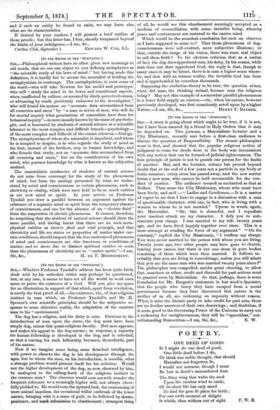[TO THE EDITOR OF THE SPEOTETOR.1
SI11,—A story is going about which ought to be true, if it is not, but I have been assured by a friend in Holy Orders that it may be depended on. Two persons, a Materialistic lecturer and a City Missionary, recently met before a first-class audience to discuss the question of Responsibility. The atomic philosopher went in first, and showed that the popular religious notion of judgment to come for deeds done in the body was inconsistent with any notion that can be formed of judicial righteousness. The first principle of justice is not to punish one person for the faults of another. But, said the lecturer, science has proved beyond doubt that at the end of a few years not a particle in my body or brain remains ; every atom has passed away, and the new matter forms a new man, who cannot be held accountable for the con- duct of another. The audience seemed as enchanted as that at Belfast. Then arose the City Missionary, whose wits must have been lively, and said :—" Ladies and Gentlemen,—It is a matter of regret to me that I have to engage in a discussion with a man of questionable character, with one, in fact, who is living with a woman to whom he is not married." Uprose in wrath, again, the Materialist. "Sir, this is shameful, and I repudiate your insolent attack on my character. I defy you to sub- stantiate your charge. I was married to my wife twenty years ago, and we have lived happily together ever since. This is a mere 'attempt at evading the force of my argument." "On the contrary/' replied the City Missionary, "I reaffirm my charge. You were never married to the person with whom you are living. Twenty years ago, two other people may have gone to church, bearing your names, but there is not one atom in your bodies remaining of those which were then married. It follows in- evitably that you are living in coucubinage, unless you will admit that you are the same man who was married twenty years since F' The philosopher was compelled, amidst great cheering, to allow that, somehow or other, credit and discredit for past actions must be granted even by Materialists. So that, perhaps, there is some foundation for Mr. Burgess's statement in last week's Spectator, that the people who fancy they have escaped from a moral government because they have discovered that nature is the mother of us all, are reckoning on impunity without reason. When it suits the Atomic party to take credit for past acts, there are no livelier asserters of their own deservings ; and doubtless, if it seem good to the Governing Power of the Universe to carry out a reckoning for unrighteousneas, they will be "speechless," not-
withstanding Democritue.—I am, Sir, &c., E. W.






























 Previous page
Previous page